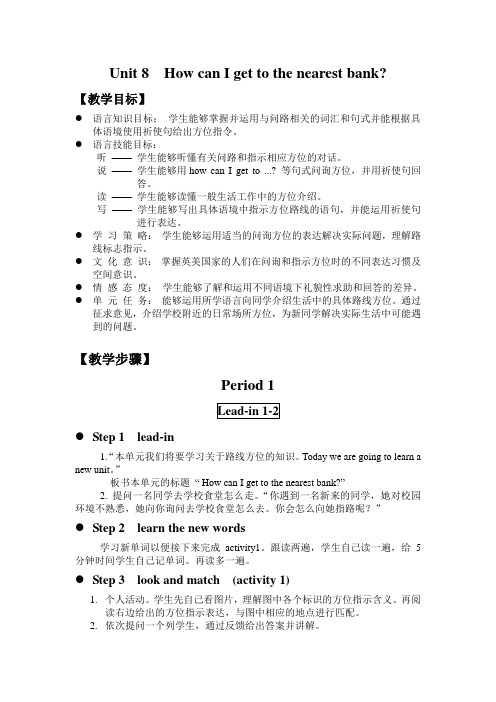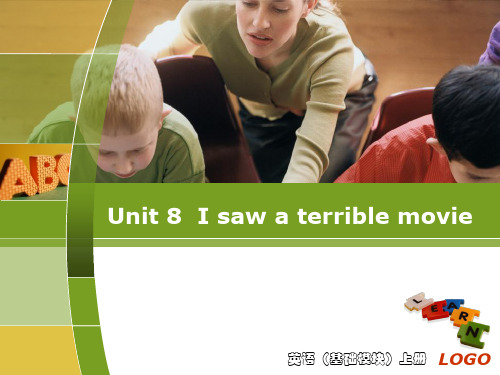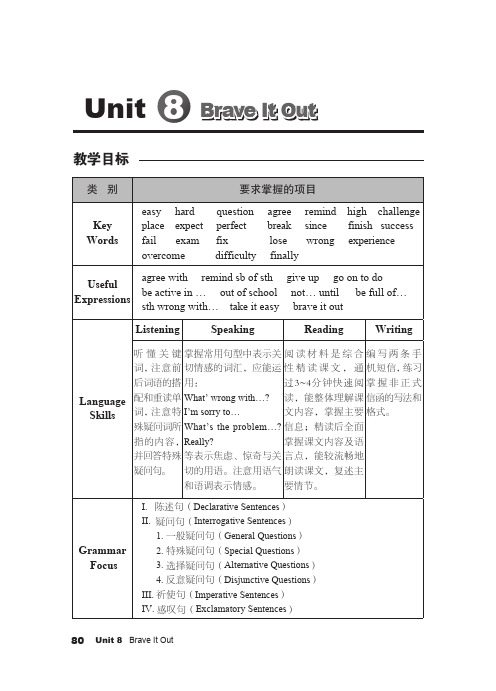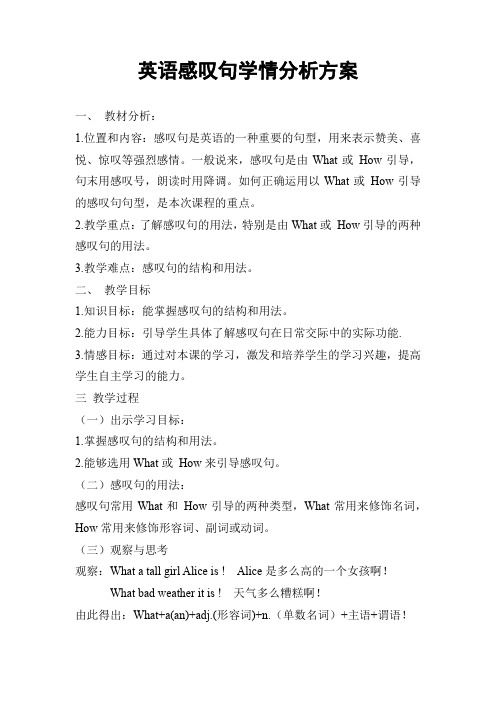基础模块上册Unit8
- 格式:ppt
- 大小:4.66 MB
- 文档页数:44

Unit 8 How can I get to the nearest bank?【教学目标】●语言知识目标:学生能够掌握并运用与问路相关的词汇和句式并能根据具体语境使用祈使句给出方位指令。
●语言技能目标:听——学生能够听懂有关问路和指示相应方位的对话。
说——学生能够用how can I get to ...? 等句式问询方位,并用祈使句回答。
读——学生能够读懂一般生活工作中的方位介绍。
写——学生能够写出具体语境中指示方位路线的语句,并能运用祈使句进行表达。
●学习策略:学生能够运用适当的问询方位的表达解决实际问题,理解路线标志指示。
●文化意识:掌握英美国家的人们在问询和指示方位时的不同表达习惯及空间意识。
●情感态度:学生能够了解和运用不同语境下礼貌性求助和回答的差异。
●单元任务:能够运用所学语言向同学介绍生活中的具体路线方位。
通过征求意见,介绍学校附近的日常场所方位,为新同学解决实际生活中可能遇到的问题。
【教学步骤】Period 1●Step 1 lead-in1.“本单元我们将要学习关于路线方位的知识。
Today we are going to learn a new unit。
”板书本单元的标题“ How can I get to the nearest bank?”2. 提问一名同学去学校食堂怎么走。
“你遇到一名新来的同学,她对校园环境不熟悉,她向你询问去学校食堂怎么去。
你会怎么向她指路呢?”●Step 2 learn the new words学习新单词以便接下来完成activity1。
跟读两遍,学生自己读一遍,给5分钟时间学生自己记单词。
再读多一遍。
●Step 3 look and match (activity 1)1.个人活动。
学生先自己看图片,理解图中各个标识的方位指示含义。
再阅读右边给出的方位指示表达,与图中相应的地点进行匹配。
2.依次提问一个列学生,通过反馈给出答案并讲解。
3.打乱顺序,就图片分别提问全班同学,去各栋大厦分别该怎样走。

v108.mpg Unit 8 Brave It OutObjectivesWhen the students finish the unit, they should know : 1. the useful expressionsremind challenge experience success agree with give up go on to do be active in What’’s wrong (with you)? WhatWhat’’s the matter (with you)? What2. the grammar itemCategories of sentencesFocus1.Make the students master the useful expressions 2.Help the students to understand the grammar. 3.Initiate a conversationTeaching proceduresI. Warming upLook at the pictures and think about the following questions. Which job do you prefer? Why? Do you think life is hard or easy for you? Why? Do you think everybody’s life should be the same? If everybody’s life is not the same, can we say that life is fair? Students can express their different opinions freely. II. Reading1. Lead-in “challenge”. For students, Now, I’ll tell you something about school is the most challenging place in the life of young people today, because a good education is the only way to success. Everyone has different experiences, so we may say life is unfair for each one. Patrick is an American-born Chinese. When he was young he was hurt in a diving challenges to finish his school courses. Finally he became a good English teacher. Life is unfair for Patrick, but he has been successful. Please read the text as fast as possible and fill in the blanks with proper words and phrases orally in the practice exercises after reading the text. Ask the students to skim the reading material and answer the questions. l Have you heard of the story of Patrick and what do you think of him? l What will you do if you fail many times some day ?2. Make the students read the material carefully, try to understand the main idea of the text. Five minutes later, ask students to complete the blanks on page63. Tell the students to look through the passage again and check the answers. III. Language studyA . A. Deal with some difficult language points (1) Do you agree with the idea that life is fair? agree with sth. E.g. : I agree with your answer. (2) It reminded me of something a teacher said when I was a high school student. remind sb. of sth. The picture reminded me of the days we worked on the farm. (3) But he never gave up and went on to finish school. give up go on to do sth. e.g. : She has given up the idea. After he finished writing the letter, he went on to read the text. (4)Now he is very active in teaching English and helping children who are out of school. be active in doing sth. He is active in helping classmates who have difficulty in learning. ’t a failure until he (5)A man can fail many times, but he isnbegins to blame somebody else. not…until…’clock. He didn’t go to bed until 10 oB. GrammarCategories of sentences 1. Declarative sentences I go to school by bike every. She does n’n’t like playing basketball. t like playing basketball. Tom can speak English. 2. Interrogative sentences 1) General questions ----Does she like music? ----Yes, she does ----Is there a map on the wall? ----No, there isn’t. ----Did you to school yesterday? ----Yes, I did. 2) Special questions question word: who, whom, whose, what, which, when, what time, where, why, how, how many, how much ----Who is the man over there? ----He is our English teacher. ----Why are you late for school today? ----I miss the early bus. ----Whose coat is this? ----It ----It’’s Tom ’s. 3) Alternative questions ----Is this a basketball or a football? ----It ----It’’s a basketball. ----which is your bag, the blue one or the yellow one? ----The blue one. 4) Disjunctive questions ----You are from Australia, aren ’t you? ----No, I ’m not. I ’m from Canada. ----She didn ’t visit her aunt yesterday, did she? ----Yes, she did. 3. Imperative sentences Sit down, please. Close the door, please. Don ’t put the flowers on the table, please. Never do it again. 4. Exclamatory sentences 1) How + adj. /adv. + subject + verb! How nice the flowers are! How fast Tom is riding on his bike! 2) What + a (an) + adj. + noun(single) + subject + verb! What a big apple it is! What an interesting book it is! 3) What + adj. + noun(pl.) or uncountable noun + subject + verb! What good students they are! What bad news it is! IV. Comprehensive Language Skills A. ListeningListen to the dialogues between Mary and Jack and fill in the missing words to complete each of the dialogues according to what you have heard. Then answer the questions orally. The question of the first dialogue: Why is Jack late? (The key :Because he got up late this morning.) The questions of the second dialogue: 1) Who is making the noise? What ’s Jack doing? (The key: Jack. He is fixing the door.) 2) Does Mary care much about noise? (The key: No, she doesn ’t.) Play the tape again and fill in the blanks then check the answer. If needed, play the tape the third time. B. Reading & Speaking This dialogue is about expressing concern. Read the dialogue with your partner. Understand the dialogue between Mary and Jack. Invite some of them to act it out Show more useful expressions: What What’’s wrong (with you)? What What’’s the matter (with you)? Anything wrong? What What’’s the problem? What happened? You look terrible. Are you ill? You don ’t look well. You look down. I lost m y …I failed … I don ’t feel … Really ?I ’m sorry to hear that. Oh, dear! I ’m sorry to hear that. Is that so? I ’m sorry to hear that. Take it easy. Don Don’’t worry. It It’’s not a big problem. Take the dialogue between Mary and Jack as an example to have a talk with your partner in the following situations. The useful expressions may help you. 1.You have lost your money. 2.Your computer is down. Act it out in the class. C. WritingIn this part ,help the students write a text message on the mobile phone. The text message on the mobile is brief and simple. 1. You new telephone number. 2. Ask when to go and see your teacher. (Example: Dear Mary, when shall we go and see our teacher? Please tell me, my new phone number is 3456789.) V. Sum- upFrom this unit, you have learned: useful verbs: useful nouns”useful expressions: a new grammar item: AssignmentWrite down what you have learned from “Brave it out”Role-play activityExpressing Concern Step1 Warming up the dialogue on page 66. Step2 Explaining the situation of the task, then work in pairs to act it out with their partner. Step3 Helping the students deal with necessary expressions about the topic. Step4 Carrying on group work to prepare the following situations: 1. You have lost your money. 2. Your computer is down. Step5 Inviting two or three pairs to act them out. 。



教学目标教学要求与建议I . Warming Up1. 教学内容分析与要求这部分的任务是让学生初步掌握本单元话题及相应的应答。
共有五幅图画用来进行口语练习。
教师提问 warming up 中的3个问题,要求学生如实回答。
不妨多重复几次,回答面宽一些,鼓励更多学生开口操练。
2. 教学建议(1)教师可先引导学生做课文中的看图说话练习。
教师可以先做示范,然后让学生模仿进行问答练习。
(2)由看图说话过渡到 warming up 中的3个问题,要求部分学生用英语知识回答,以培养学生说的能力,接着引入新课。
(3)检查预习生词和短语的情况,可让学生拼读单词,掌握多音节词的重音位置。
II . Reading1. 教学内容分析与要求本单元的课文是精读课文,通过精讲多练的教学,使学生能够掌握教学目标中列出的 words 和 useful expressions 的基本用法,能够在 3-4 分钟内快速阅读理解课文,能用较正确的语音、语调和语句重音朗读课文,并能按主题句的提示复述课文。
如:easy hard question agree remind high challengeplace experience expect perfect break since finishsuccess overcome difficulty finally fail exam fixlose wrongagree with remind sb of sth give up go on to dobe active in … out of school not… untilsth wrong with… take it easy brave it outbe full of… What’s wrong (with you )?What’s the matter (with you )?What happened?What’s the problem? Anything wrong?词汇短语句型Do you agree with the idea that life is fair?It reminded me of something a teacher said when I was a high school student. Life is full of challenges. 句子But he never gave up and went on to finish school. A man can fail many times, but he isn’t a failure until he begins to blame somebody else. 2. 教学建议(1)用英语向学生简要介绍 “Is life fair?”Now, I’ll tell you something about “challenge”. For students, school is the most challenging place in the life of young people today, because a good education is the only way to success. Everyone has different experiences, so we may say life is unfair for each one. Patrick is an American-born Chinese. When he was young he was hurt in a diving accident. Since then he has been in a wheelchair and overcome life’s most difficult challenges to finish his school courses. Finally he became a good English teacher. Life is unfair for Patrick, but he has been successful.Please read the text as fast as possible and fill in the blanks with proper words and phrases orally in the practice exercises after reading the text.(2)对教学目标中指出的 words 和 useful expressions 的用法和相关的主要语言点进行必要的举例讲解,下面的“教学参考资料”内容视学生情况而定,作参考使用,不必全部讲到。

英语感叹句学情分析方案一、教材分析:1.位置和内容:感叹句是英语的一种重要的句型,用来表示赞美、喜悦、惊叹等强烈感情。
一般说来,感叹句是由What或How引导,句末用感叹号,朗读时用降调。
如何正确运用以What或How引导的感叹句句型,是本次课程的重点。
2.教学重点:了解感叹句的用法,特别是由What或How引导的两种感叹句的用法。
3.教学难点:感叹句的结构和用法。
二、教学目标1.知识目标:能掌握感叹句的结构和用法。
2.能力目标:引导学生具体了解感叹句在日常交际中的实际功能.3.情感目标:通过对本课的学习,激发和培养学生的学习兴趣,提高学生自主学习的能力。
三教学过程(一)出示学习目标:1.掌握感叹句的结构和用法。
2.能够选用What或How来引导感叹句。
(二)感叹句的用法:感叹句常用What和How引导的两种类型,What常用来修饰名词,How常用来修饰形容词、副词或动词。
(三)观察与思考观察:What a tall girl Alice is ! Alice是多么高的一个女孩啊!What bad weather it is ! 天气多么糟糕啊!由此得出:What+a(an)+adj.(形容词)+n.(单数名词)+主语+谓语!What+adj.(形容词)+不可数名词/名词复数+主语+谓语!再观察:How fast Alice runs ! Alice跑的多么快啊!How smart the rabbit is ! 这个兔子是多么聪明啊!由此得出:How+adj. /adv.(形容词/副词)+主语+谓语!How+adj.+a/an+可数名词单数+主语+谓语!(四)总结规律并进行练习感叹句引导词用法小诀窍1.形容词与名词紧挨用What。
2.形容词与名词不挨用How。
练习:What a bright boy he is! 他是多聪明的男孩啊!How bright the boy is! 这个男孩是多么的聪明啊!How good apples they are! 他们是多么好的苹果啊!(五)巩固练习用What, What a, What an, How 填空______a clever boy he is!______ cold it is today!______ nice weather it is!______ hard they are working!(六)小结识记识记感叹句引导词选用的诀窍。
_______号考__________名姓____--------------------------------------基础模块上册 unit8 英语试题I. 找出划线局部发音不同样的选项。
( 共 15 分,每题 1 分)1.A. brave B. cake C. place D. challenge2. A. driver B. remind C. high D. since3. A. student B. success C. education D. computer4. A. overcome B. boss C. noise D. wrong5. A. brave B. education C. finally D. place6. A. overcome B. independence C. difficulty D. expect7. A. machine B. wheelchair C. challenge D. catch8. A. experience B. question C. independence D. perfect9. A. success B. easy C. scientist D. else10. A. really B. clear C. idea D. break11. A. high B. accident C. remind D. driver12. A. wrong B. wheelchair C. where D. with13. A. fix B. exam C. excuse D. mix14. A. success B. difficulty C. education D. surprise15. A. finish B. finally C. since D. activeII. 单项选择题 .( 每题 1 分,共 30 个)16. —— Is there anything wrong with my heart ?——Nothing serious. .A. Take it easyB. Cheer upC .No way D. What a pity17. The story reminds me my past.A. withB. ofC. forD. onit in English.A. you sayB. do you speakC. do you sayD. you speak19. He made up his mind to smoking.A. give awayB. give inC. give upD. give20. Some girls help ________ the rooms clean.A. do B to clean C. to do D to keep21. afraid of make mistakes.A. Don ’tB. Not to beC. Not beingD. Be not22. After they had read the text ,the students the exercises.A. to on to do B . went on doingC. went on to do D . go on doing23. The mother_______ the roomthe child fellasleep.A. didn ’tleave, whenB. notleave, untilC .left,until Ddidn ’tleave, until24. I __________my key to mybedroomyesterday.A loseB lost Chave lost D waslosing25. Our teacherasked us______our bedroomclean.A keep on Bkeep C to keep Dto keep on26. Tom______likereading at all.He interested inplayingbasketball.A. doesn’t ,is B. doesn’t,were C. is,does D. was,is27. I don ’tyou.__级班--------------------------------------A agree to Bagree on Cagree with Dagree that28. He is veryactive answeringthe teacher'squestion.A. inB. onC.of29. morechildren in thecountryside areof school..A. ofB. outC.in D. off30. We havelearned in thisschool________halfpast year.A inB for Csince D on31.They gotmarried in 1998._______then theyhave been livinginLondon.A sinceB for Cas D with’s father isfixing hischair______ahammer.A atB with Cat D about33.The old book________me________mygrandfather.- - - - - - - - - - - - - - - - - - - - - - - - - - - - - - - - - - - - - -A reminded ofB remember ofC reminded withD remember at ’s a great________that she has finished all the courses at thecollege.A challengingB challengeC successD successful35.We often have an English party ________Saturday evenings.A beforeB atC inD on36.I don ’t know ________he will come on time or not.A whenB whereC whatD whether37. Please______ me for coming so late .A forgiveB forgave Cforget D forgot 38.Please_______here, the baby is sleeping.A not shout Bnot speak C speak D don ’t shout- - - - - - - - - - - - - - - - - - - - - - - - - - - - - - - - - - - - - -39. We elevenclasses everyday..A. have B . has 第 1 页共 3 页-C. will have D . is having 54. B .lesson C .attention D .trouble40. Zhang Li ______at 6 every day. 55. B .print C .read D .expressA get upB got upC gets upD will get up IV. 阅读理解〔每一空 2 分,共 30 分〕____ an apple and ten bananas in the can take any 〔A〕of them. When I was in seventh grade, I was shy, quiet and so was easilyA. areB. isC. hasD. Have bullied( 受欺辱). I used to get very sad about it.42. ----There is no air or water on the moon. Is there? In an art lesson, just while the teacher was out, a big boy took---- ________. away my pencil case, threw it across the room and sat back down. LaterA. Yes, there areB. No, there isn't on, he took my schoolbag and pulled it towards him. I pulled back the___C. Yes, there isn'tD. No, there is43.______bed is very clean. ______is clean ,too.A. His , MineB. My , Hims choolbag from his hand and for the first time, I pushed himaway andhit him on the back. In the rest of the lesson, I did nothingbutimagined what was happening next.____号考C. His , MeD. Him , Myshopping tomorrowA. goesB. will goC. goD. isgoing45. you be at home at seven thisevening.A. will C. Will D. DoIII. 1 10 完形填空〔每一空分,共分〕Then the teacher came to me, “Peter, are you OK? 〞“Yes,〞 Ianswered.“No, you are not. Come to my office after class. 〞 hesaid.There we had a long talk. He mademe smile and Ibecameconfident( 自信“ ) again. He taught me some life lessons, and said, Getup, anddon t be a bully yourself, but remember you are strongerinside, and ’________It is often said that eyes can speak.Do you have such kind of__21__?In a bus you may look at a stranger ,but not too __22__ .Ifhe notices that he is being looked at ,he may __23__is the samein daily you are looked at for several more times ,you will look __24__ up and downin order to __25__ if there is anythingwrong with __26__ goes wrong,you will feel angry with the personwho is looking at you.__27__ can speak ,right?if the bullies see this, they will stop. 〞I remembered these words. From then on, every time as Iwalked toschool, I put my head high in the way, and the bullying soonstopped.56. Why was Peter often bullied in seventh grade?A. he had no friends to help himB. he didn ’t study wellC. he camefrom a poor familyD. he was quiet and notconfident57. What happened to Peter in an art lesson?__名姓L ooking too long at someone may seem to be impolite.But sometimesthings are __28__.If you wish to draw someone's __29__,you may lookat him or her for more than ten lovers ,they enjoy lookingat each other longer to showthe love that words cannot __30__Clearly .,A. He took away the other ’s pencil case.B. He madefun ofanotherstudent.C. He fought back for the first time.D. Hetold the secretto the teacher.eye communication should be done according to the relationship between 58. How did Peter feel after it happened?the two people and the certain situation. A. Lucky. B. Worried. C. Excited. D. Confident.______级班46. B.fear C.experience D.exercise47. B .long C .low D .loud48. B .smell C .sound D .taste49. B .himself C .myself D .yourself50 B guess C hear D expect ....51 B nothing C everything D anything ....52 B Eyes C Mouth D Nose ....53 B difficult C tiring D boring ....59. Where did Peter have a long talk with his teacher?A. In the classroom.B. At the teacher ’s house.C. At Peter ’s home.D. In the office.60. The teacher told Peter he should _____.A. believe in himselfB. work hard on his lessonsC. have stronger bodyD. tell it to the teacher at once〔〕 BWhen the man s wife died, their youngest baby was 2 yearsold. ’第 2 页共 3 页They had six other children – three boys and three girls, aged from In a small village there lived a lazy man. He would do nothing all4 to 16. day but daydream. Whenever he was hungry, he would go out, ask forThe man’s parents and his wife ’s parents came to visit them. food, come back and hang out.“We’ve been talking about how to make this work, 〞 they said. One sunny afternoon, he was very hungry. With great difficulty, “There’s no way you can take care of all these children and work he got a pot of milk from one of his neighbors. He took this pot andto makea living. So, w e’ve decided to place each child with a different started daydreaming again.uncle and aunt. 〞“It is this pot of milk that is going to makemerich, 〞 he thought.The man refused. Over the next few weeks, he moved the family to “I can make butter from the milk. Then I go to the market and sella tiny town and his business developed quickly. People came from far it, 〞 his dream went on. “With the money I get, I will buy a coupleaway to do business with him. And the children helped him both at home of goats. They will have kids after six months. Soon I would have a and at work. large number of goats. 〞The children grew up and got married. Five of the seven went off “Then I will buy some more cows and have a farmhouse. I will start to college. The children ’s success was a source of pride to the father. a dairy farm ( 奶牛场). ⋯〞 the man kept smiling to himself.Finally, the youngest daughter, who was 2 years old when the mother “Howsmart I am,〞he thought. Lost in his minds, his pot fell down, died, got married. With his life ’s work done, the father died. and drenched himself in milk.This man’s work had been the lonely but joyful task of raising 66. We know the fact that the man had trouble in _____.__his family. This manwas my father. I was the 16-year-old, the oldest A. having friends B. finding a job C. making dreams D. gettingof seven. food____号考_________66. There were ______ children in the man ’s family.A. fiveB. sixC. sevenD. eight67. The man’s parents and his wife ’s parents came to his house to______.A. suggest raising his children in different familyB. talk about finding a new wife for himC. give him money to support the familyD. help take good care of his children63. What does the underlined word refuse mean?“〞A. B. C. D. 感谢拒绝悲伤放弃64. Which of the following is TRUE?A. Nearly half of the man s children went tocollege. ’B. The man wanted to give his children to theiruncle.67. What did the man do after he got the pot of milk?A. He made his daydream.B. He sold it for money.C. He drank it.D. He dropped it.68. What does the underlined word “drench〞 mean in Chinese?A.满足B.丧失C.溅湿D. 生产69. What do you think of the man?A. Lazy.B. Poor.C. Happy.D. Smart.70. We can infer( ) from the story that the man _____. 推断出A. became rich in the endB. did nothingC. owned a big farmD. raised lots of goatsV. : ( 15 ) 作文共计分Write a letter to your friend, telling him or her your ideaabout life .〔要求:注意书信的格式, 80 词左右〕_名姓C. The man moved his family and opened a business.D. The man thought life was hopeless after his wife died.65. The story mainly talks about ______.A. why the father didn t give up his family ’B. talk about finding a new wife for himC. give him money to support the familyD. help take good care of his children63. What does the underlined word refuse mean? “〞A. B. C. D. 感谢拒绝悲伤放弃64. Which of the following is TRUE?A. Nearly half of the man s children went to college. ’B. The man wanted to give his children to their uncle.C. The man moved his family and opened a business.D. The man thought life was hopeless after his wife died.65. The story mainly talks about ______.A. why the father didn t give up his family ’D. help take good care of his children63. What does the underlined word “refuse 〞 mean?A. 感谢B. 拒绝C. 悲伤D. 放弃64. Which of the following is TRUE?A. Nearly half of the man ’s children went to college.B. The man wanted to give his children to their uncle.C. The man moved his family and opened a business.D. The man thought life was hopeless after his wife died.65. The story mainly talks about ______.A. why the father didn ’t give up his familyB. how the children succeeded after their mother diedC. why the father was lonely______级D. how the father raised his large family〔C〕(完满版)基础模块上unit8英语试题第 3页共 3 页。